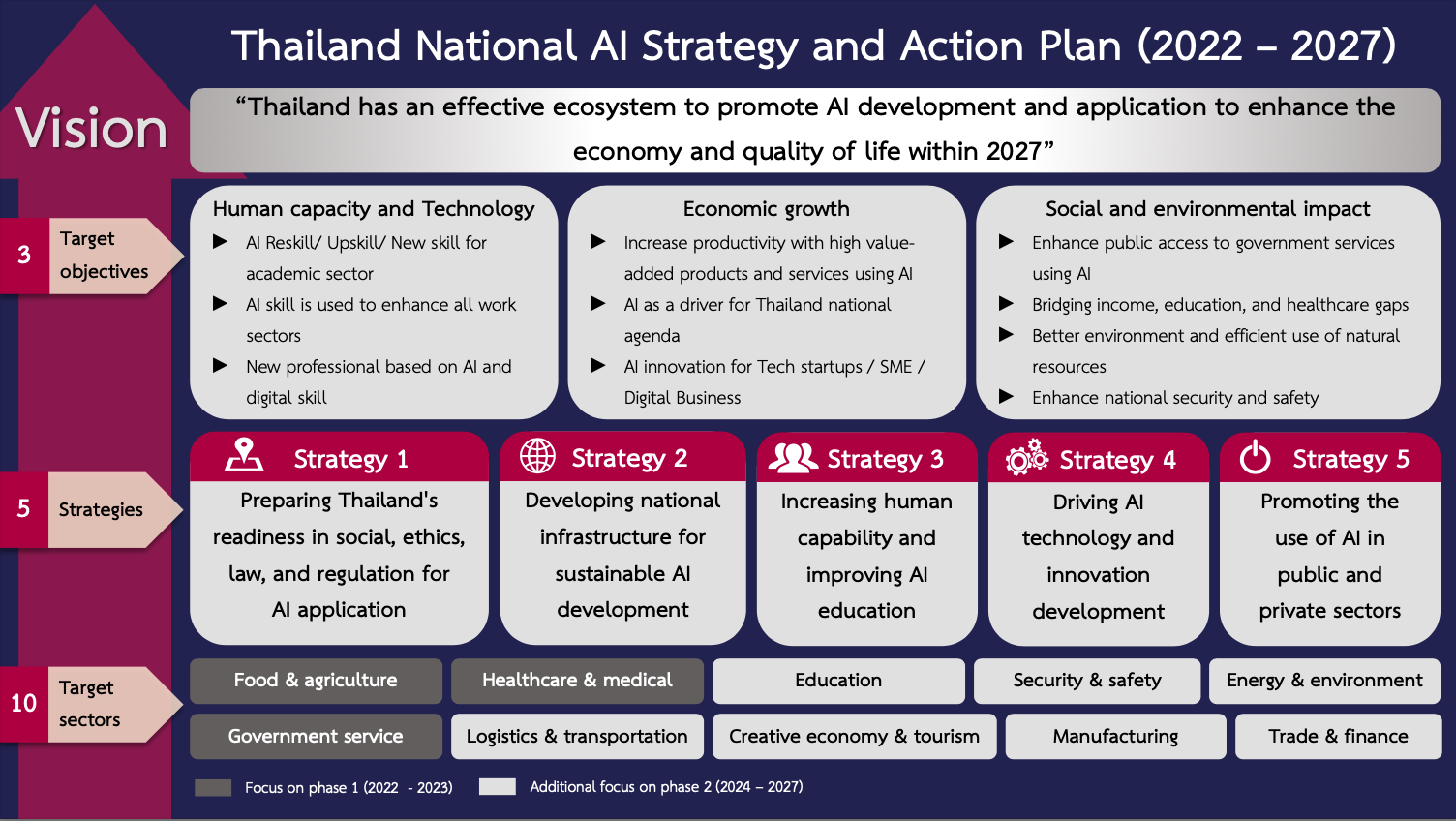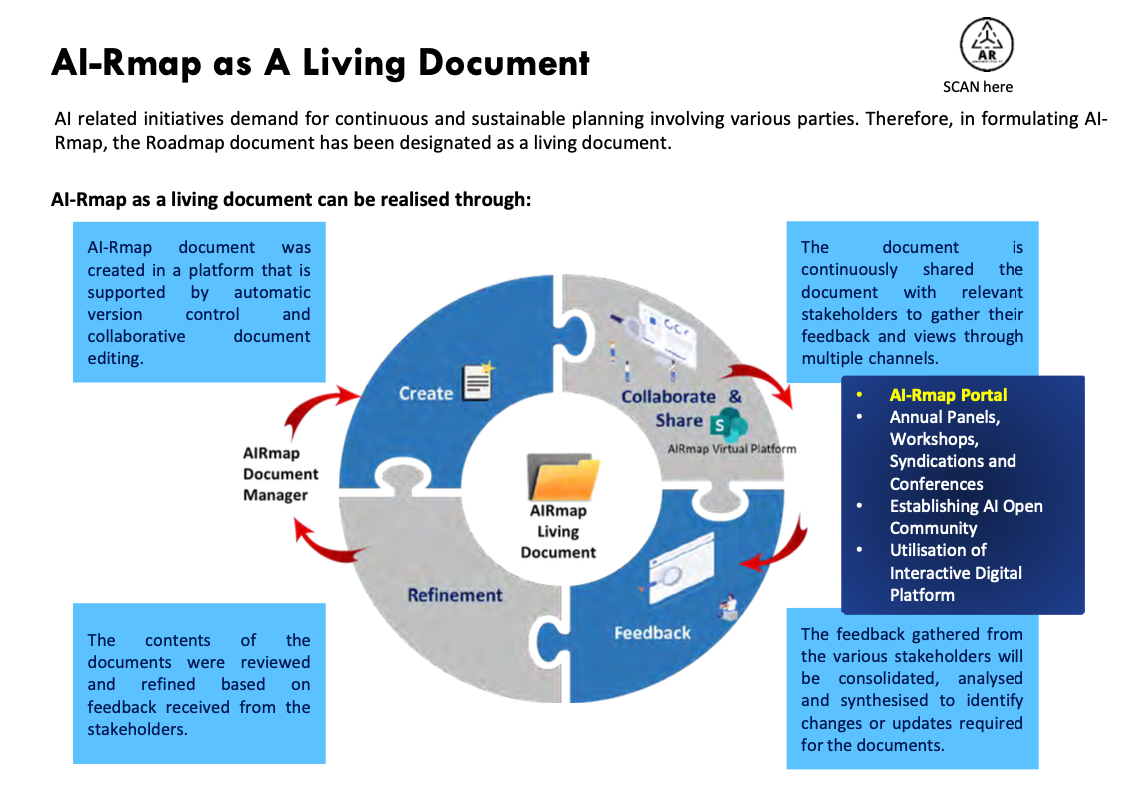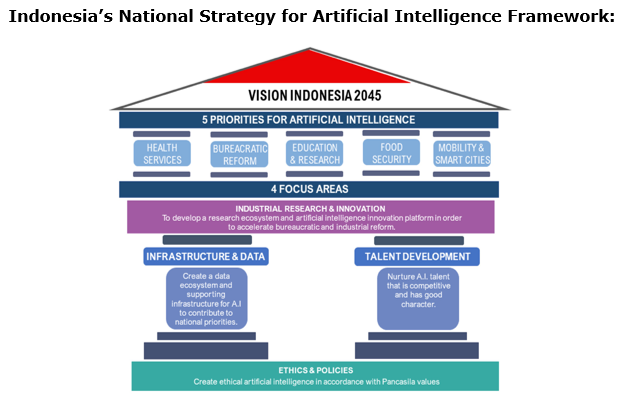Chapter: | Vietnam | Thailand | Malaysia | Indonesia | Conclusion |
Vietnam
In March 2021, the Vietnamese government promulgated the National Strategy on Research, Development and Application of Artificial Intelligence. The short-term goals include establishing the national center for big data storage and high-performance computing, and the national innovation centers for AI by 2025. This Strategy also aims to increase the number of AI startups, enhance investment in the field, and widely apply AI in public administration and online public services to stimulate social innovation and ensure efficient governance. Additionally, the Strategy seeks to maintain social order and safety nationwide, promote sustainable economic development, and promote AI applications in major cities such as Hanoi, Ho Chi Minh City, and Da Nang.
The long-term objective of the Strategy is for Vietnam to rank among the top four ASEAN countries in AI research, development, and application by 2030. Implementation strategies involve connecting domestic data centers and high-performance computing center to facilitate the shared network of big data and computing for AI. This includes universalizing the basic skills of AI applications, boosting labor productivity, fostering innovation, and reducing costs. Moreover, Vietnam intends to comprehensively enhance the quality of life for the general public by using AI in defense, security, rescue operations, disaster prevention, and epidemic responses.
For example, in recent years, Ho Chi Minh City has gradually adopted AI in healthcare, education, transportation, and cybersecurity. Many hospitals in the city now use AI in diagnosis, treatment, and writing prescriptions. In transportation, roadside cameras collect data on vehicle types, traffic flow, congestion levels, and more. The Smart Traffic Operations Centre utilizes AI algorithms to analyze and predict traffic conditions based on this data.
In line with the National Strategy on Research, Development and Application of Artificial Intelligence, the Ministry of Science and Technology (MOST) of Vietnam is responsible for promoting the development of AI and data science. Key initiatives include formulating regulations related to AI intellectual property rights, enhancing community data projects such as the Digital Vietnamese Knowledge System, and supporting AI research while developing high-performance computing platforms.
MOST also funds research centers in academia and facilitates international collaboration to share data and technology. This is aimed at enhancing Vietnam's position in the global AI landscape, developing Vietnamese AI products and brands, and fostering high-level AI talent to meet both domestic and global market needs.
The Vietnam Artificial Intelligence Festival 2023 (AI4VN 2023) highlighted "AI: Power for Life,” which demonstrated how artificial intelligence contributes to daily life. The goal of the festival was also to enhance understanding of AI technology applications while serving as a bridge for the public and private sectors in terms of AI development policies. The event also delved into discussions on topics such as AI trends in financial and big data applications in healthcare.
During remarks at the event, Minister of Science and Technology Huỳnh Thành Đạt emphasized that in alignment with the National Strategy on Research, Development and Application of Artificial Intelligence, Vietnam should begin preparing its workforce for the development of its AI ecosystem. Moreover, Minister Huỳnh Thành Đạt stated Vietnam should have the objective of positioning the country as an innovation and AI hub within ASEAN and the world at large.
It is also worth noting that during the AI4VN Summit 2019, 許輝煌 Hui-Huang Hsu, Director of Science and Technology Division, Taipei Economic and Cultural Office in Vietnam, shared Taiwan's experiences in AI development.

Former director of Science and Technology Division in Vietnam, Hui-Huang Hsu, shared Taiwan’s AI experiences at the AI4VN Summit 2019.
(Credit/Source: Taipei Economic and Cultural Office in Vietnam)
From anecdotal evidence, it is evident that Vietnam is looking to train domestic professionals with technical skills to promote the expansion and sustainability of the AI ecosystem in Vietnam. However, the rate of training AI talent in Vietnam still falls short of immediate market demands. Both the public and private sectors within Vietnam could consider strengthening the recruitment of foreign AI experts to assist in improving the efficiency of domestic training institutions. Promoting collaboration between industry and academia could be a more effective approach.
Thailand
In July 2022, the Thai Cabinet approved the Thailand National AI Strategy and Action Plan 2022-2027 (Thailand NAIS). Thailand NAIS’ vision is for Thailand to have a more comprehensive AI ecosystem by 2027 to promote the development and application of AI to enhance the economy and quality of life for the general public. As laid out in the following image, the Thailand NAIS includes 3 target objectives, 5 strategies, and 10 target sectors.

Thailand National AI Strategy and Action Plan 2022-2027
(Credit / Source: AI Thailand / NECTEC)
In March 2022, the National Science and Technology Development Agency (NSTDA) of Thailand released its AI Ethical Guidelines. These guidelines are consistent with major international AI ethical standards and cover various aspects such as AI research, design, development and application as well as technology transfer. The aim is to ensure the ethical development and use of AI technology and data science, which includes algorithms driven by AI. The objective of the Guidelines is to prevent and reduce the potential negative impact of AI on society.
In June 2023, the Thai government announced the establishment of the Big Data Institute (BDI) to effectively manage big data across public and private sectors. This initiative also serves as a part of the country’s efforts to formulate future economic and social policies. BDI also uses data as a basis to provide solutions, address challenges, enhance productivity, and formulate economic policies across various domains. In addition, BDI is also Thailand's first government agency that utilizes big data to benefit society as a whole.
One key aspect of BDI is to offer Big Data Analysis Services that adhere to international standards and support innovative projects. In addition, BDI aims to foster the development of the data analytics industry while providing training for big data professionals.
During a press conference in August 2023, NSTDA discussed the year-to-date progress of the Thailand NAIS. Achievements included the establishment of the Government Data Center and Cloud Service (GDCC) as a central cloud system for storing government data. Other accomplishments involved the publication of Thailand's first AI Ethics Handbook, holding AI Ethics Self-learning Courses, and promoting the proper use of AI through the AI Governance Clinic (AIGC).
In addition, Thailand is also home to LANTA, the most powerful supercomputer within ASEAN, which is dedicated to supporting AI research in both the public and private sectors. Overall, the Thai government has invested 12.9 billion Thai Baht in funding for AI R&D and the training of 83,721 AI professionals. Furthermore, the Thai government has allocated an additional 639 million Thai Baht into AI startups. These efforts have significantly contributed to Thailand's technological development and helped the country move from 59th to 31st on the Government AI Readiness Index 2022.
Malaysia
In 2021, Malaysia’s Ministry of Science, Technology and Innovation (MOSTI) introduced the Malaysia National Artificial Intelligence Roadmap 2021-2025 (AI-RMAP). AI-RMAP is a living document which updates continuously. The site (airmap.my) has been designed to incorporate suggestions from various sectors regarding different aspects of AI development. It operates in a cyclic model of "Create, Collaborate & Share, Feedback, and Refinement." To ensure alignment between new developments and environments to overcome challenges posed by AI transformation. The primary aim of AI-RMAP is to assist Malaysia in joining the ranks of developed nations by establishing a prosperous and sustainable AI innovation ecosystem.
The success of AI-RMAP relies on highly strategic cooperation among Government, Academia, Industry, and Society. The roadmap outlines 6 major strategies, including:
- Establish AI Governance by Setting up AI Coordination and Implementation Unit (AI-CIU).
- Advancing AI R&D by Building a Robust AI R&D Ecosystem.
- Escalating Digital Infrastructure to Enable AI.
- Fostering AI Talent and AI Skilled Workforce.
- Acculturing AI by Increasing Awareness & Adoption of AI.
- Kick-Starting a National AI Innovation Ecosystem by Establishing AI Innovation Hub.

Malaysia National Artificial Intelligence Roadmap 2021-2025 (AI-RMAP) - airmap.my
(Credit / Source: Ministry of Science, Technology and Innovation)
In October 2023, MOSTI Minister Chang Lih Kang stated that the code of ethics & governance is expected to be ready by 2024 and shall serve as the foundation for Malaysia's AI regulations. MOSTI will also research the establishment of an AI legal framework and legislation that aligns with the “Privacy & Security” under the “Principles for Responsible AI” in AI-RMAP.
MyDIGITAL outlines how the Malaysian government aims to “Digital-Driven” the transformation of Malaysia into a developed nation and become a regional leader in the digital economy. The Malaysia Digital Economy Blueprint provides detailed explanations of the measures necessary to achieve MyDIGITAL’s vision. This includes the developmental trajectory of the digital economy concerning Malaysia's overall economic growth as well as the necessary infrastructure and strategies to bridge the digital divide.
To accelerate the digital economy and drive the digital transformation of public sectors by increasing the adoption of digital technologies and tools to increase efficiency and productivity. For instance, the government plans to utilize AI to combat cyberattacks, employ AI chatbots for public services, implement blockchain to streamline medical records and cultivate adaptable and competitive digital talent.
The launch of such initiatives to enhance digital skills for the digital economy involves developing and improving the workforce's digital skills in areas such as AI, cybersecurity, content creation, data analytics, system integration as well as other related professional skills. The goal of this initiative is to elevate the workforce's specific digital skills in professional development and allow professionals such as AI experts to share knowledge, expertise, and skill sets.
To drive Malaysia towards cloud and big data analytics services, the government actively organizes AI-related events. For instance, the Malaysia Digital Economy Corporation (MDEC) hosts the Annual AI and Big Data Week (AIDW), which aims to facilitate the integration and application of AI and big data among participating agencies and organizations.
In conclusion, AI-RMAP has highlighted AI development in areas such as education, healthcare, agriculture, manufacturing, and smart cities. The Malaysian government has encouraged active participation from various sectors to discuss and provide recommendations for AI policy guidelines. By addressing issues like data privacy, ethics, and responsible AI, Malaysia is formulating AI-related laws to adapt to future developments.
Indonesia
With a population of 270 million, Indonesia is the most populous country in ASEAN and the largest island nation in the world. Since President Joko Widodo took office in 2014, Indonesia has aimed to become a "Global Maritime Fulcrum" by expanding ports and constructing sea bridges to boost the country's economy and international maritime trade.
In April 2018, during the Indonesia Industrial Summit 2018 (IIS’ 2018), the Indonesian government officially launched the roadmap called “Making Indonesia 4.0”, which emphasizes the five key technologies of the Fourth Industrial Revolution: Internet of Things (IoT), AI, sensor technology, human-machine interaction, and robotics.
In August 2020, the Indonesian government launched the National Artificial Intelligence Strategy for Indonesia 2020-2045 (STRANAS KA). The Strategy focuses on five major areas: Artificial Intelligence, Internet of Things (IoT), Advanced Robotics, Augmented Reality, and 3D Printing. The goal of STRANAS KA is to support Indonesia in reducing reliance on natural resources while enhancing the country’s innovative economic development.
In 2022, the National Research & Innovation Agency (BRIN) established the Research Center for Artificial Intelligence and Cybersecurity (RCAICS), with a focus on three research domains: Computer Vision & Image Processing, Machine Learning, and Cybersecurity. Additionally, BRIN has implemented AI-related projects in areas that referenced STRANAS KA such as health services, bureaucratic reform, education, research, food safety, and smart cities.

Indonesia plans to relocate its capital to Nusantara by 2024 and transform it into a smart and ecologically sustainable city. The Nusantara Capital City Authority (Otorita Ibu Kota Nusantara, IKN) is incorporating smart lighting technology into urban planning to enhance energy efficiency, conservation, safety, and environmental friendliness. However, attention must still be paid to the operation of AI systems, as they have access to personal, corporate, and government data, which are vulnerable to cyberattacks. It is essential to consider the information security of Cyber-Physical Systems to prevent social disruption and harm.
Being the most populous country in ASEAN, Indonesia's ability to obtain technological assistance from multinational corporations is crucial. For instance, over the past ten years, Google Indonesia has collaborated with the Jakarta Transportation Agency on a non-commercial agreement called Project Green Light. The collaboration aims to address air pollution caused by traffic congestion in Jakarta. To reduce emissions and improve air quality, Google utilized AI to conduct research and provide recommendations to the Jakarta government, which included insights into signal timing and traffic congestion.
Conclusion
After decades of AI research and development, the advent of transformative Generative AI has prompted countries to formulate AI policies based on principles such as openness, transparency, putting people first, responsibility, and ethics. These policies must also carefully consider the world’s diverse cultural contexts and potential impacts on different populations.
For example, Indian Prime Minister Modi's remarks made in December 2023 touched upon the linguistic diversity of India. His remarks marked the first implementation of real-time AI voice translation to accommodate the rich variety of languages spoken in India. In Indonesia, the plan to relocate the capital focuses on creating a smart city to address long-standing issues like environmental pollution and marine waste. Australia has concentrated on preventing natural disasters, conserving wildlife, and conducting research. New Zealand, on the other hand, has showcased a synergy between technology and humanistic care by incorporating indigenous values into advanced technologies and policies that promote social inclusivity.
In today's global landscape, one pressing challenge is the expansion of "digital authoritarianism" by authoritarian regimes that use AI technology. The international community has rapidly recognized and formed cross-regional organizations to address this issue. For instance, the QUAD, a multilateral cooperative effort, aims to curb the spread of misinformation through AI technology and establish monitoring mechanisms.
Currently, Taiwan’s major potential threat comes from the language. Large AI models that include the data in Simplified Chinese which inevitably contain information and ideology from authoritarian regimes. Differences in regional terminology can also lead to variations in AI-generated results. In response, the Taiwanese government has launched the Trusted AI Dialogue Engine (TAIDE; 可信任人工智慧對話引擎) to create an independent large-scale language model tailored for Taiwan. In October 2023, the National Science and Technology Council of Taiwan (NSTC) established the Research Institute for Democracy, Society and Emerging Technology (DSET; 科技、民主、社會研究中心) to provide a comprehensive policy framework for security and national-level social equity. DSET aims to address geopolitical threats and reduce risks that technology poses to humanity by strengthening the connections between the government, the private sector, the public, and innovative technologies.
Taiwan has based its AI policy planning trajectory on factors such as geopolitical developments, language, and industrial advantages. Taiwan, as a global hub for semiconductors, formulated the Taiwan Chip-based Industrial Innovation Program (晶片驅動臺灣產業創新計畫). This Program leverages the country’s world-class strengths in semiconductor manufacturing, packaging, and testing by applying these advantages with key technologies like generative AI to develop innovative applications. The Program also involves early positioning for the future of Taiwan's technology industry, fostering accelerated innovation across all industries, strengthening domestic talent development in R&D, and attracting international investment.
New Southbound Countries' Policy on Artificial Intelligence
Reference / Sources:
Vietnam
Thailand
Malaysia
Indonesia
India